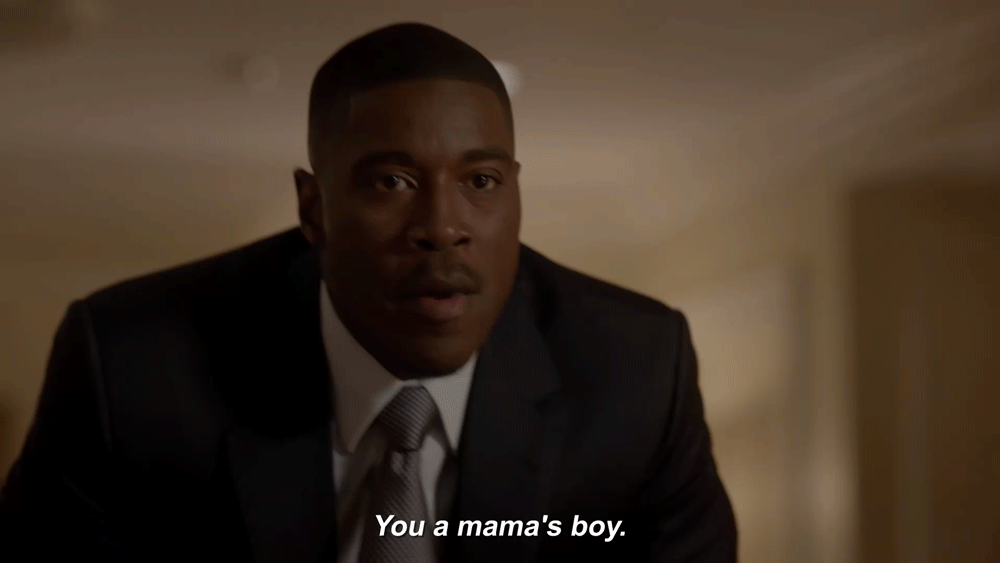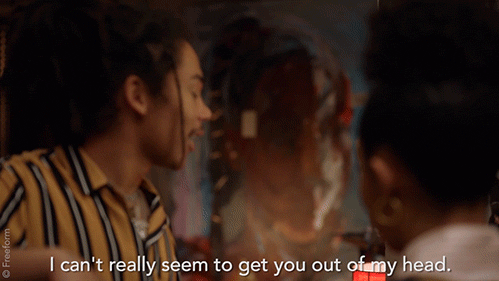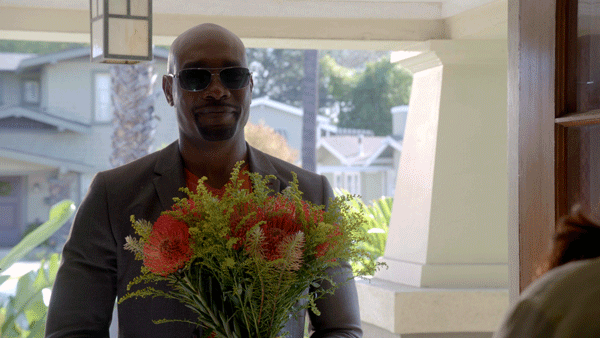
A couple of weeks ago, I ended up having an impromptu—count it—four-hour-long conversation with a newly engaged couple. Although the topics pretty much ran the gamut of marriage, one thing, in particular, took longer than just about everything else. What was it? House chores. More specifically, folding clothes.
As the soon-to-be husband went on and on about how particular he is about folding and the soon-to-be wife shared that she couldn't care less about folding at all, let alone doing it in a specific kind of way, I was like, "Let's make sure to talk this thing through, then. You don't live together yet, but you might be surprised how something as 'small' as a pile of clean laundry can cause two people to fall all the way out after six months or so."
It's them (and that convo) that has inspired this piece. Over the years of having conversations with lots of married couples who love each other, but do honestly wish that they had been better prepared for what they got themselves into prior to jumping the broom, here are 10 things that all singles should definitely discuss with their partner prior to saying "I do."
10 Conversations Every Couple Should Have Before Marriage
1. Their Partners Real Views on Politics and Religion

Recently, I had a conversation with a white male client of mine on the topic of politics and race relations that had me so fired up that I seriously contemplated not working with him anymore. I mean, hearing him talk about how white men are currently the most oppressed demographic in our country right now was enough to make me want to hang up and block my number. Then I had to remind myself that we see things through totally different life lenses, and he was saying that kind of stuff because he doesn't deal with people of color often (clearly). At least for the time being, he needs a "double minority" to educate him on some things. Life lessons sometimes come in the most cryptic forms.
I'm sharing that little tale because, while a lot of us were taught to never discuss politics and religion with others (I don't totally agree with that, by the way), that's not something that is going to fly with a marriage partner. I have friends who didn't make these things enough of a priority while they were dating and now, they are uncomfortable, if not totally pissed, because they are an activist while their spouse couldn't be more passive or empathetic, or they want their spouse to go to church with them while their husband or wife couldn't care less about religion.
Our views on politics and religion speak volumes to how we see and move through society. These two things are definitely something that you and yours should talk about. More than just on the surface or a couple of times too.
2. Their Partner’s Relationship with Their Parents

Sigh. I can't tell you how many mama's boys I know and yes, many of them are married. While they are disguised as men who simply have a deep love and appreciation for their mother, pay attention to things like how much the son financially contributes to his mom's life, how much of y'all's business that he tells her and/or if she's respectful towards you—both in and out of your presence. A friend of mine has been in counseling with her husband for years because he doesn't know how to establish healthy boundaries with his mother. As a result, his wife isn't his top priority; his mother is. That's not how it's supposed to be either. So yeah, you really need to pay attention to the dynamic your man has with his mom.
Something else that's important is having serious discussions about both of your upbringings. Not having one or both parents in the home affects a child. Being abused or neglected (which is a form of abuse) affects a child. Constantly moving (which sometimes teaches you to detach easily) affects a child. I could go on and on, but I think you get my point. A child's spirit is extremely fragile.
If it is broken and not healed, it can cause that child to become a fractionated adult; one with the kind of issues that you don't sometimes see until after you marry them.
3. Their Partner’s Perspectives on Leadership and Submission

Another one of my friends has a wife who loathes the word "submit". Meanwhile, it doesn't get more Alpha male than her husband. Personally, submission is not a word that bothers me; not in the least. To me, it's not about having a lack of power; it's about directing it in such a way that makes my partnership with my husband that much more effective…supernatural even.
Unfortunately, I don't think a lot of women see it that way. The thought of submitting, on any level, totally freaks them out. The reality is if you profess to be a Bible believer, it's a biblical instruction (Ephesians 5:22, Colossians 3:18). But don't miss that as you submit to your husband, he is supposed to submit to the Lord. Otherwise, he's not going to be a good leader; he's not going to value the gift of you sharing your power, in order to make him and your marriage better.
The friend that I just told you about? He had no clue that his wife treats submission like a cuss word until after they got married. I bet you can just guess how that union is going right about now. Listen, I'm not saying that you have to see submission the exact way that I do. What I am advising is most marriages do have some level of leadership/submission roles in them. Don't assume that you and yours are on the same page on this. Instead, be very upfront and honest in discussing them. As soon as possible, please.
4. How Their Partner Handled Stressful Situations

Another couple that I know, it's all good. That is, until there a stressful situation comes up. Then the husband becomes controlling and overbearing. He doesn't listen to his wife's counsel, he's patronizing and condescending, and that pushes her to the point of screaming and throwing stuff. Yep, it's a hot mess.
A part of the reason why I really like couples who were genuine friends before they became lovers is because it's easier to see someone's true colors that way. Friends tend to see one another at their best and at their worst. This means they know how they act when things are going their way and when they aren't.
A lot of folks are wonderful to be around—until they lose their job, a bill isn't paid or they receive some type of bad news. Then they reveal a totally different side of themselves. If you and your man have never gone through some bona fide hard times, wait a while before contemplating marriage. A spouse who can't handle stressful situations is a spouse that is going to make your life miserable during moments like those (moments that are bound to happen).
5. How Their Partner Prioritized Money

SMDH. Boy, the examples just keep on coming today. There are two different couples that I've worked with, who are divorced today. A big part of the cause is related to money. It's been my observation that in a lot of marital dynamics, one spouse tends to be more, "intentional" is the word that comes to mind, when it comes to things like planning, saving and responsible spending. Then there's the other who is a lot more free-spirited. The two couples that I'm referring to, the wives were all about running up thousands of dollars in credit card debt due to impulsive spending more than anything else. Here's the thing, though—they had jacked up credit, were asking their daddy for money all of the time and were putting clothes before bills when they were single. Meanwhile, the then-boyfriends figured that everything would somehow miraculously change once their then-girlfriends married them.
I don't know what makes people think that a stroll down an aisle is going to somehow miraculously break a person's lifestyle habits and patterns.
If there is something that is concerning you now about your partner's relationship with money or there's something you know you need to get better at yourself, now would be the time to address it; not after you are husband and wife. Otherwise, there's a huge chance that you could end up…just like those now four divorced people are.
6. Their Partner’s Sex Drive

I remember an engaged woman once sharing with me how excited she was to be getting married. Being that I love all things sex, and I knew that she and her fiancé were waiting until their wedding night to do-the-do, I asked her if she was looking forward to that as well. She paused and then said, "I mean, I think my husband and I are looking forward to just sharing a bed and cuddling more than anything else. Sex isn't the focal point." Girl, please. Your man has waited for years for you and copulation isn't gonna be a focal point for him?! (I should've referred her to Dr. Myles Munroe's message, "Men Don't Want Sex, They Need Sex".)
Yet, I deal with couples constantly where, while they seem to have been able to master the other rooms of their home, their bedroom is always a point of contention. One has a higher sex drive or a totally different set of expectations than the other. And when those needs aren't met, disappointment and resentment, start to creep in.
A very important staple of marriage is sex. Whether you decide to wait until marriage or not, before you partake, it needs to be talked about. Matter of fact, if you are currently sexually active with your partner, it should probably be discussed more because, as a husband once told me, "Having sex with a girlfriend is very different than having sex with your live-in business partner." He was speaking of his wife. Those are pearls of wisdom right there.
7. Their Partner's Previous Dating Patterns

One of my friends, while she was dating her now-husband, they spoke pretty freely about their past dating experiences. Some people don't think that's wise, but I think that if two individuals are comfortable enough to do that, it speaks to a level of self-confidence, comfortability and resolve that is healthy. Anyway, her husband had two serious loves before her. When she asked why they ended, he casually mentioned that they didn't like his dynamic with his mom; they thought it was extremely codependent.
At the time, my friend chalked it up to two women being potentially bitter about the break-up. Oh, but bay-bay! Ask her now if that's what she thinks! He and his mother continue to have an extremely toxic relationship but, unlike his exes, she has a daily front row seat to it.
Hopefully, if we're all paying close attention, our past relationship will help us to learn and grow. At the same time, patterns are patterns, so it never hurts to unpack what you and your man's dating patterns have been. Better to see a red flag now and work through it, than totally ignore them and end up being blindsided—or ready to file those papers—later.
8. How Important (or Not Important) Romance Was to Their Partner

There are some husbands I know who love their wives with every fiber of their being. At the same time, they don't have one romantic bone in their entire body. Birthdays consist of a gift card that may or may not be in a greeting card. Anniversaries are when their wife can expect something functional more than sentimental. Holidays? Oh, it's a practical gift all the way. Usually one that the wife isn't thrilled with either.
If your kind of personality isn't romantic either, then this is no big deal. But if you've got a chick flick collection in your house, or your future wedding has been planned out ever since you were a little girl, trust me, you're gonna be ir-ri-ta-ted if your husband isn't big on giving roses for no reason or whisking you away for a romantic weekend a few times a year.
I've sat with couples where a spouse (usually the wife) felt neglected due to the lack of romance they were experiencing. If you know that it's a priority for you, this is something else that needs to be ironed out. If your significant other couldn't care less, well, I'll just say that until death parts you is a really long time to go without something that is so important—to you.
9. How Consistent Their Partner Was/Is

Something that's a top characteristic that I desire in my future husband is consistency. When a person is consistent, they are reliable and dependable; they don't contradict themselves; they are firm in their principles and convictions; they come from a place of truth and logic. They are steady individuals.
There have been writing gigs, friends and of course, men that I have left behind, all because they were super duper inconsistent. The gigs didn't pay when they said they would (oh, but they didn't play when it came to wanting their copy on time!). The friends were there when they needed something, but were suddenly MIA whenever I did. And the men? One man told me that whatever he said to me on a random Monday, he meant and whatever he said to me on the following Saturday is also what he meant, even if they were two totally different things. He was dead serious too, chile.
If you're seeing a lot of inconsistencies now, don't simply chalk it up to moodiness or "a phase". An inconsistent person 1) shows signs of it prior to marriage and 2) typically doesn't change without wanting to, followed by some really extensive therapy, after acknowledging it.
If you get motion sick, multiply that times a thousand, and that's just the tip of the iceberg of what it's like to deal with an inconsistent individual. You've been warned.
10. If They and Their Partner Were Truly Friends—Or Not

A while back, I wrote an article about what you should absolutely expect out of your friendships—loyalty, honesty, protectiveness, support, compassion, good communication, respect, availability, selflessness and being a safe place. This is not the kind of stuff that happens overnight (so don't be trippin' if you've been dating for a year and he's not ready to pop the question yet), and it's definitely the kind of things you should expect from the person that you want to share the rest of your life with.
You know what, though? It's an epidemic, the amount of people who absolutely DO NOT make being genuine friends with their significant other a top priority. They're so focused on wanting a spouse, that a friend isn't even on their radar. Not only is that sad, it's a potential marriage-destroyer (just ask any married person that you know).
A soon-to-be divorced individual recently said to me that he wished he had taken out more time to establish a true friendship with his soon-to-be ex-wife. He said that it probably would've kept them from getting married in the first place, because the reality of their lack of true compatibility would've come out. Or, at the very least, they would've fought for their marriage more because they didn't want to hurt the friendship. #sigh
The moral to the story with all of this is, while nothing can teach you about yourself quite like marriage can, you can actually dodge a few bullets (including marrying the wrong person), if you pay close attention to stuff like what we just before jumping the broom.
Again, just ask any married person that you know. Better yet, any divorced one.
Featured image by Getty Images
Want more stories like this? Sign up for our newsletter here and check out the related reads below:
Like, Love & In Love: How To Really Know The Differences
This Is Why You're So Frustrated With Dating
- Sooo...Do You Want A Marriage? Or Just A Wedding? - xoNecole ›
- 10 Things I Wish I Knew Before I Got Married - xoNecole ›
- Things To Know Before Getting Engaged - xoNecole: Women's Interest, Love, Wellness, Beauty ›
- 7 Differences Between Marriage & Dating - xoNecole: Women's Interest, Love, Wellness, Beauty ›
- 10 Things Married Couples Need Daily - xoNecole: Women's Interest, Love, Wellness, Beauty ›
- Six Things Women Wished Men Knew In Dating - xoNecole: Women's Interest, Love, Wellness, Beauty ›
- Wives Share What To Know Before Getting Married - xoNecole: Lifestyle, Culture, Love, & Wellness ›
- 10 Married Couples Share The Keys To Their Totally Off-The-Chain Sex Life - xoNecole ›
- 10 Things Married People Wish They Knew Before They Said "I Do" ›
- 4 Things I Wish I Knew Before I Got Married | The Financial Diet ... ›
- 14 Things We Wish We Knew Before Getting Married - The Warm Up ›
- 6 Women Share What They Wish They Knew Before They Got Married ›
- 15 People Share What They Wish They Knew Before Marriage ... ›
- 7 Little Things People Wish They Knew Before Getting Married ... ›
Exclusive: Viral It Girl Kayla Nicole Is Reclaiming The Mic—And The Narrative
It’s nice to have a podcast when you’re constantly trending online. One week after setting timelines ablaze on Halloween, Kayla Nicole released an episode of her Dear Media pop culture podcast, The Pre-Game, where she took listeners behind the scenes of her viral costume.
The 34-year-old had been torn between dressing up as Beyoncé or Toni Braxton, she says in the episode. She couldn’t decide which version of Bey she’d be, though. Two days before the holiday, she locked in her choice, filming a short recreation of Braxton’s “He Wasn’t Man Enough for Me” music video that has since garnered nearly 6.5M views on TikTok.
Kayla Nicole says she wore a dress that was once worn by Braxton herself for the Halloween costume. “It’s not a secret Toni is more on the petite side. I’m obsessed with all 5’2” of her,” she tells xoNecole via email. “But I’m 5’10'' and not missing any meals, honey, so to my surprise, when I got the dress and it actually fit, I knew it was destiny.”
The episode was the perfect way for the multihyphenate to take control of her own narrative. By addressing the viral moment on her own platform, she was able to stir the conversation and keep the focus on her adoration for Braxton, an artist she says she grew up listening to and who still makes her most-played playlist every year. Elsewhere, she likely would’ve received questions about whether or not the costume was a subliminal aimed at her ex-boyfriend and his pop star fiancée. “I think that people will try to project their own narratives, right?” she said, hinting at this in the episode. “But, for me personally – I think it’s very important to say this in this moment – I’m not in the business of tearing other women down. I’m in the business of celebrating them.”
Kayla Nicole is among xoNecole’s It Girl 100 Class of 2025, powered by SheaMoisture, recognized in the Viral Voices category for her work in media and the trends she sets on our timelines, all while prioritizing her own mental and physical health. As she puts it: “Yes, I’m curating conversations on my podcast The Pre-Game, and cultivating community with my wellness brand Tribe Therepē.”
Despite being the frequent topic of conversation online, Kayla Nicole says she’s learning to take advantage of her growing social media platform without becoming consumed by it. “I refuse to let the internet consume me. It’s supposed to be a resource and tool for connection, so if it becomes anything beyond that I will log out,” she says.
On The Pre-Game, which launched earlier this year, she has positioned herself as listeners “homegirl.” “There’s definitely a delicate dance between being genuine and oversharing, and I’ve had to learn that the hard way. Now I share from a place of reflection, not reaction,” she says. “If it can help someone feel seen or less alone, I’ll talk about it within reason. But I’ve certainly learned to protect parts of my life that I cherish most. I share what serves connection but doesn’t cost me peace.
"I refuse to let the internet consume me. It’s supposed to be a resource and tool for connection, so if it becomes anything beyond that I will log out."

Credit: Malcolm Roberson
Throughout each episode, she sips a cocktail and addresses trending topics (even when they involve herself). It’s a platform the Pepperdine University alumnus has been preparing to have since she graduated with a degree in broadcast journalism, with a concentration in political science.
“I just knew I was going to end up on a local news network at the head anchor table, breaking high speed chases, and tossing it to the weather girl,” she says. Instead, she ended up working as an assistant at TMZ before covering sports as a freelance reporter. (She’s said she didn’t work for ESPN, despite previous reports saying otherwise.) The Pre-Game combines her love for pop culture and sports in a way that once felt inaccessible to her in traditional media.
She’s not just a podcaster, though. When she’s not behind the mic, taking acting classes or making her New York Fashion Week debut, Kayla Nicole is also busy elevating her wellness brand Tribe Therepē, where she shares her workouts and the workout equipment that helps her look chic while staying fit. She says the brand will add apparel to its line up in early 2026.
“Tribe Therepē has evolved into exactly what I have always envisioned. A community of women who care about being fit not just for the aesthetic, but for their mental and emotional well-being too. It’s grounded. It’s feminine. It’s strong,” she says. “And honestly, it's a reflection of where I am in my life right now. I feel so damn good - mentally, emotionally, and physically. And I am grateful to be in a space where I can pour that love and light back into the community that continues to pour into me.”
Tap into the full It Girl 100 Class of 2025 and meet all the women changing game this year and beyond. See the full list here.
Featured image by Malcolm Roberson
This Is How To Keep 'Holiday Season Stress' From Infecting Your Relationship
Hmph. Maybe it’s just me, but it seems like there is something really weird happening in the fall season air (because winter doesn’t officially begin until December 21) that cuddle season is in full swing while break-up season is as well. In fact, did you know that break-ups are so popular during the holiday season that December 11 is deemed Break-Up Day?
The reasons why relationships shift around this time vary; however, I did both roll my eyes and chuckle when I read that a very popular one is because it’s an easy way to get out of getting one’s significant other a Christmas present. SMDH.
Anyway, I personally think that the less shallow folks out here may contemplate calling things “quits” or they at least distance themselves a bit from their partner (and what I’m referring to is serious relationships) due to all of the stress and strain that oftentimes comes with the holidays whether it be financial, familial, due to their tight schedules or something else.
Listen, I would hate for you and your man to miss the fun and happiness of experiencing this time of year, all because you are so overwhelmed or irritated that you can’t really enjoy it. That’s why I have a few practical tips for how to avoid allowing the typical holiday season stress from INFECTING your relationship.
Manage Your Expectations
 Giphy
GiphyUnmanaged expectations. If there is a main reason why the holiday season tends to be so stress-filled for so many people, I’d bet good money that this is the cause. And when you’re in a long-term relationship, expectations can manifest themselves in all sorts of cryptic and/or unexpected ways. You might have relatives who assume that you are going to be with them for Thanksgiving or Christmas when you have other plans in mind. You might be thinking that you are going to spend one amount for presents while your man is thinking something totally different. When it comes to scheduling, your signals may be crossed.
And you know what? To all of these scenarios, this is where clear and consistent communication come in. Don’t assume anything. Don’t dictate anything either. From now until New Year’s, mutually decide to check in once a week, just to make sure that you are both on the same page as it relates to the holidays and what you both are thinking will come along with it. The less blindsided you both feel, the less stressed out you will be. Trust me on this.
Set (and Keep) a Budget
 Giphy
GiphyOkay, so I read that last year, 36 percent of Americans incurred some type of holiday-related debt. Hmph. Last year, there was still some sense of normalcy in this country, chile, so I can only imagine what finances are gonna look like over the next several weeks. That said, since I don’t know a lot of people who don’t find being broke stressful, make sure that you and your bae set a budget and then stick to it this year — no ifs, ands or buts.
Because really, y’all — it doesn’t make sense to deplete savings and/or max out credit cards for a few days of giggles only to be damn near losing your mind because you don’t know how to make ends meet come Dr. Martin Luther King, Jr. Day.
And by the way, this tip doesn’t just speak to things like food and gifts; I also mean travel. If it doesn’t make a ton of sense (or cents) to be all over the place this year — DON’T BE.
Keep Matthew 5:37 at the Forefront
 Giphy
GiphyIf off the top of your head, you don’t know what Matthew 5:37 says, no worries, here ya go: “But let your ‘Yes’ be ‘Yes,’ and your ‘No,’ ‘No.’ For whatever is more than these is from the evil one.” That verse right there? Oh, it’s a boundaries lifesaver! I say that because do you see “maybe” or “I’ll think about it” in there? Nope. LOL. It says that you should tell people “yes” or “no” and leave it at that — and that complements Anne Lamott’s quote, “’No’ is a complete sentence” impeccably well. Yeah, you’ve got to remember that anything beyond a yes or no to a request is privileged information; you don’t owe anyone details or an explanation.
Besides, if you are really honest with yourself, when someone asks you something and you give a “Umm, let me think about it” kind of reply, more times than not, you already know what your answer is going to be — so why not let you both off of the hook? Give your response. Commit to that. And let everyone (including yourself) get on with their lives and schedules.
I promise you that when it comes to those holiday parties, you are pissing more folks off by not RSVP’ing or doing so and not showing up than just saying, “Thank you but not this year” off the rip.
Remember That Your Personal Space Is Privilege Not a Right
 Giphy
GiphyA friend of mine recently bought a new house and invited me over to come see it. He’s a single man with no children, so as I was taking in all of the space that he had, especially as I walked through his finished basement, I joked about relatives coming to live with him. “Hell no” and “absolutely not” were pretty much his immediate responses as he went on to say that some folks even had the nerve to be offended when he told them that he had no intentions on taking DNA in.
Ain’t it wild how people think that your stuff is their right? And yes, that brings me to my next point. Your home is your sanctuary space. If you want to host folks this year — cool. If not, ALSO COOL. Please don’t let folks (family included) guilt you into how they want you to act or even into what they would do if the shoe was on the other foot. You are not them — and as one of my favorite quotes states, “If two people were exactly alike, one of them would be unnecessary.” (A man by the name Larry Dixon said that.)
Hell, my friends? They know that I am good for sending them random things that they need or even want all throughout the year. Coming over to hang out at my pace, though. Uh-uh. Chalk it up to being a card-carrying member of the ambivert club yet I like keeping my living space personal — and I sleep like a baby, each and every night, for feeling that way.
Always remember that your space, your time, your resources, your energy and shoot, yourself period (including your relationship), are all things that are your own. You get to choose how, when and why you want to share them. The holiday season is certainly no exception.
Cultivate Some “You Two Only” Traditions
 Giphy
GiphyIt’s not uncommon for some couples to hit me up after the holiday season to “detox.” Sometimes it’s due to the financial drama (and sometimes trauma) that they experienced. Sometimes it’s because they allowed their relatives (especially in-laws) to get more into their personal business than they should’ve. More than anything, though, it tends to be because they didn’t get enough quality time together and so ended up feeling “disconnected.”
Please don’t let that happen. Listen, I’m not even a holidays kind of woman and yet, I will absolutely sit myself down with some hot chocolate and chocolate chip cookies to enjoy a Hallmark holiday film or two. Aside from the fact that most of them are lighthearted and sweet, I also like that they usually focus on couples loving on each other amidst all of the holiday beauty and ambiance — which is something that all couples should set aside some time to do.
Maybe it’s a vacation. Maybe it’s a staycation. Or maybe it’s my personal favorite, A SEXCATION. Whether it’s for a few days, the weekend or even overnight — don’t you let the holidays go by without setting aside time for you and your man to celebrate one another. Don’t you dare (check out “Are You Ready To Have Some Very Merry 'Christmas Sex'?”).
GET. SOME. REST.
 Giphy
GiphyI once read that 8 out of 10 people get stressed out over the holidays and 3 out of 10 lose sleep during to it — and when you’re stress-filled and sleep-deprived, that can absolutely lead to hypersensitivity, making mountains out of molehills and even not being in the mood for sex.
Your relationship can’t afford to go through any of this, so definitely make sure to prioritize rest. I don’t care how unrealistic it might seem during this time, sleep should never be seen as a luxury; it will always and forever be a great necessity.
That said, try to get no less than six hours of shut-eye in (check out “6 Fascinating Ways Sex And Sleep Definitely Go Hand In Hand”) and even ask your bae to take a nap with you sometimes (check out “Wanna Have Some Next-Level Sex? Take A Nap, Sis.”). Not only will sleep help to restore your mind, body and spirit but, when it’s with your partner, it’s an act of intimacy that can make you both feel super connected, even in the midst of what might feel like chaos.
___
Holiday season stress is real. Still, never give it the permission or power to throw your relationship off. Put you and your man first and let the holidays be what they are gonna be, chile.
Let’s make things inbox official! Sign up for the xoNecole newsletter for love, wellness, career, and exclusive content delivered straight to your inbox.
Featured image by Shutterstock









